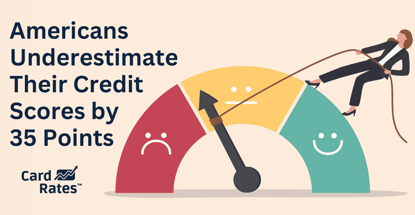
Our experts and industry insiders blog the latest news, studies and current events from inside the credit card industry. Our articles follow strict editorial guidelines.
A recent survey conducted by CardRates.com has lifted the curtain on a stark reality: Many Americans are playing a guessing game with their credit scores — and losing. The survey asked 3,000 respondents to estimate their credit scores, with an average score emerging from the study of 683. That is a modest figure when compared to the actual national average credit score of 717.
Unfortunately, this latest data suggests that many consumers may be navigating their financial lives with a skewed compass. Overestimation of creditworthiness isn’t merely an overindulgence in self-esteem; it’s a misstep that can lead people to make ill-advised financial commitments. They may stride confidently into credit applications only to face rejections or burdensome loan terms — ultimately, a recipe for financial strain.
On the flip side of this fiscal coin, the survey revealed that a tendency to underestimate credit scores can be just as harmful. Individuals erring on the side of caution may bypass valuable financial opportunities or acquiesce to unfavorable credit terms, all due to a lack of awareness of their true credit standing. This underestimation can prevent people from reaping the benefits their actual credit scores allow, such as favorable loan rates, and can deter them from pursuing life-changing goals like buying a home or investing in education.
Most States Underestimated Credit Scores, But a Few Had an Inflated View
Regional disparities paint a more detailed portrait of this national issue. For example, North Dakota respondents generally rated their credit scores 49 points below the state’s average (717) — a significant undervaluation of their financial stature.
Conversely, Mississippians tended to overestimate their credit score estimations by 14 points, potentially leading to financial decisions that their budgets cannot sustain.
Top 5 States Where Respondents Overestimated Their Credit Scores:
| State | Estimated Credit Score | Actual Credit Score | Difference |
|---|---|---|---|
| Mississippi | 676 | 662 | +14 |
| Louisiana | 677 | 669 | +8 |
| Arkansas | 684 | 677 | +7 |
| Kentucky | 687 | 680 | +7 |
| Oklahoma | 682 | 675 | +7 |
Top 5 States Where Respondents Underestimated Their Credit Scores:
| State | Estimated Credit Score | Actual Credit Score | Difference |
|---|---|---|---|
| North Dakota | 666 | 715 | -49 |
| Minnesota | 681 | 724 | -43 |
| Rhode Island | 668 | 709 | -41 |
| Vermont | 681 | 721 | -40 |
| Nebraska | 676 | 715 | -39 |
Regionally, many Northern states appeared to drastically underestimate their credit scores. And on the other end of the spectrum, those states that overestimated their scores the most were all in the South.
Map Shows How Much Residents From Each State Misjudged Their Scores
CardRates.com has created an interactive map showing credit score perception discrepancies in each state:
Created by CardRates • View larger version
Ashley Fricker, Senior Editor with CardRates.com, points out that a credit score is much more than a number — it’s a measure of one’s financial identity, crucial for unlocking the potential of personal prosperity:
“Understanding and accurately assessing one’s credit score is akin to having a master key in the world of finance; it can open a multitude of doors, from lower interest rates to greater borrowing power.”
The takeaway from the survey is clear: With the right information and a realistic understanding of credit scores, people can strengthen their financial positions and navigate the monetary landscape with confidence.
Ashley continues: “Stay informed, stay realistic, and use knowledge as the power to unlock financial success.”
Survey Methodology
CardRates.com surveyed 3,000 adults based on age, gender, and geography and used internal data sources to obtain population data sets. We also employed a two-step process to ensure representativeness through stratified sampling and post-stratification weighting.



![8 Best Credit Cards for Points & Miles ([updated_month_year]) 8 Best Credit Cards for Points & Miles ([updated_month_year])](https://www.cardrates.com/images/uploads/2018/02/points.png?width=158&height=120&fit=crop)
![8 Ways to Maximize Credit Card Points ([updated_month_year]) 8 Ways to Maximize Credit Card Points ([updated_month_year])](https://www.cardrates.com/images/uploads/2020/01/Ways-to-Maximize-Credit-Card-Points.jpg?width=158&height=120&fit=crop)
![9 Credit Cards With the Most Bonus Points ([updated_month_year]) 9 Credit Cards With the Most Bonus Points ([updated_month_year])](https://www.cardrates.com/images/uploads/2023/09/credit-cards-with-the-most-bonus-points.jpg?width=158&height=120&fit=crop)
![Chase Refer-A-Friend Offer: Earn Bonus Points ([updated_month_year]) Chase Refer-A-Friend Offer: Earn Bonus Points ([updated_month_year])](https://www.cardrates.com/images/uploads/2018/05/refer.png?width=158&height=120&fit=crop)
![Average Credit Card Debt By US Household in [current_year] Average Credit Card Debt By US Household in [current_year]](https://www.cardrates.com/images/uploads/2023/06/CR-AverageCreditCardDebtbyHousehold-1250X650.jpg?width=158&height=120&fit=crop)